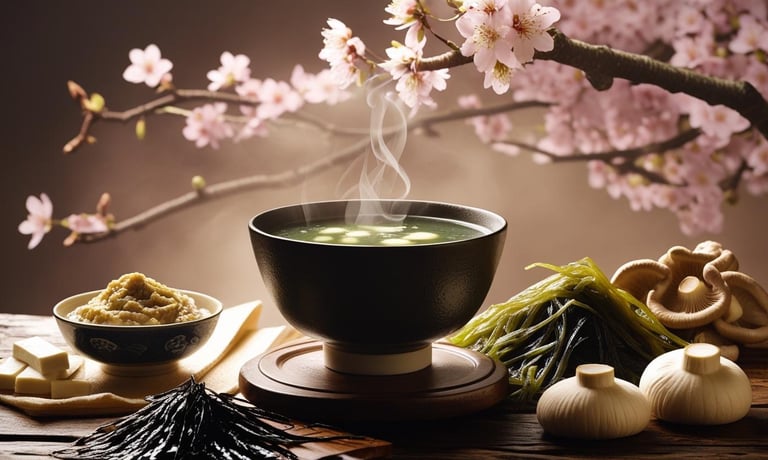Health Benefits of Japanese Miso Soup & Radiation Protection
Explore the incredible health benefits of Japanese miso soup in protecting against nuclear radiation. Learn how miso aids detoxification, boosts immunity, and supports recovery from radiation exposure, backed by historical events and scientific studies.
HEALTH & WELLNESS
By Sia Imime
6/17/20253 min read


Disclosure: This article contains affiliate links, meaning that if you purchase through them, I may earn a small commission at no extra cost to you. I only recommend products that I believe will add value to your personal growth journey.
Japanese miso soup is far more than a comforting traditional dish. Its unique nutritional and biochemical properties have been linked to protection against the harmful effects of radiation exposure. Used in Japan for centuries, miso gained particular attention after World War II, especially following the nuclear bombings of Hiroshima and Nagasaki, and later after the Fukushima disaster. In this article, we explore the historical evidence, scientific studies, and practical ways to incorporate miso into your daily life, along with recommended products to help you get started.
What Is Miso?
Miso is a fermented paste made primarily from soybeans, salt, and a fermentation starter called koji (typically made from rice, barley, or soybeans inoculated with Aspergillus oryzae). It is a staple of Japanese cuisine, used in sauces, marinades, and most famously, miso soup.
Miso is rich in probiotics, antioxidants, minerals, and vitamins—particularly B vitamins and vitamin K2. But what makes it especially relevant in the context of radiation is its fermentation process and specific compounds that help detoxify the body.
Historical Evidence: Miso After Hiroshima and Nagasaki
One of the most compelling stories about miso’s protective effects comes from Dr. Tatsuichiro Akizuki, the director of the St. Francis Hospital in Nagasaki. After the atomic bomb dropped in 1945, Dr. Akizuki reportedly fed his staff and patients a strict diet based on brown rice, miso soup, seaweed, and vegetables. According to his accounts, they were significantly less affected by radiation sickness compared to others who did not follow the diet.
This anecdotal evidence laid the groundwork for further research into the radio-protective qualities of miso. Japanese physicians and researchers began to examine the biochemical compounds in miso that may offer protection against the harmful effects of ionizing radiation.
Scientific Studies Supporting Miso’s Anti-Radiation Benefits
1. Fermentation Produces Protective Compounds
Research has shown that the long fermentation process of miso leads to the production of dipicolinic acid and other protective compounds that can bind to and help eliminate radioactive isotopes like strontium and cesium from the body.
2. High Antioxidant Activity
Miso contains powerful antioxidants such as phenolic acids, isoflavones, and saponins. These compounds reduce oxidative stress caused by ionizing radiation, thereby protecting DNA and cellular structures.
3. Radioprotective Properties of Soy-Based Diets
Several animal studies have found that soy-based foods, including miso, improve survival rates in rats exposed to radiation. These benefits are linked to the presence of genistein, an isoflavone in soy that modulates cell signaling and immune responses.
4. Intestinal Flora Protection
Radiation disrupts gut microbiota, weakening immunity. Miso’s probiotic content helps preserve gut health, which is essential for post-radiation recovery and long-term well-being.
Miso in the Wake of Fukushima
After the Fukushima Daiichi nuclear disaster in 2011, interest in miso and other traditional Japanese foods surged once again. Japanese health advocates recommended miso soup to help cleanse the body of radiation, and it became a staple in detox regimens.
Although miso is not a miracle cure, its role in detoxification, immune support, and cellular protection makes it a valuable dietary addition for those concerned about radiation exposure.
How to Use Miso for Radiation Protection
To harness the benefits of miso:
Choose Long-Fermented Miso: Darker varieties like red or brown miso typically undergo longer fermentation and have higher concentrations of protective compounds.
Avoid Boiling Miso: Heat can destroy beneficial probiotics. Add miso to soups after removing them from direct heat.
Combine with Seaweed and Vegetables: For maximum effect, prepare miso soup with wakame seaweed, shiitake mushrooms, onions, and tofu.
Recommended Miso Products
Hikari Organic Red Miso Paste – A long-fermented miso known for its deep flavor and high antioxidant content.
Eden Foods Organic Barley Miso – Traditional barley miso made with organic ingredients and aged for over a year.
Miso Master Organic Mellow White Miso – Great for beginners with a lighter taste, though less fermented than red miso.
Miso Soup Kit with Wakame and Tofu – All-in-one instant miso soup kit for convenience without sacrificing nutrition.
Koji Starter for Homemade Miso – For DIY enthusiasts who want to ferment their own miso at home.
Final Thoughts
Japanese miso soup is a symbol of culinary heritage, but its potential benefits extend far beyond taste. From post-war Japan to modern scientific labs, miso continues to prove itself as a natural protector against radiation’s harmful effects.
By integrating miso into your diet—especially long-fermented varieties—you not only nourish your body with probiotics and antioxidants but also support cellular defense mechanisms that science now recognizes as valuable in the face of radiation exposure.
Whether you're focused on wellness, preparing for emergencies, or simply exploring traditional healing foods, miso soup is a time-tested ally worth adding to your health toolkit.
Tags: miso soup, radiation protection, Japanese superfoods, anti-radiation diet, fermented foods, Hiroshima health, Fukushima nutrition, soy isoflavones, natural detox, immune support
